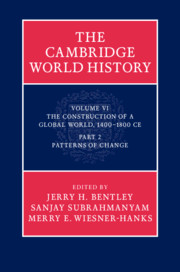Book contents
- The Cambridge World HistoryVOLUME VI
- The Cambridge World History
- The Cambridge World History
- Copyright page
- Dedication
- Contents
- Figures
- Maps
- Tables
- Contributors
- Preface
- Part One Migrations and Encounters
- Part Two Trade, Exchange, and Production
- Part Three Religion and Religious Change
- Part Four Questions of Method
- Index
- References
Part Four - Questions of Method
Published online by Cambridge University Press: 05 May 2015
- The Cambridge World HistoryVOLUME VI
- The Cambridge World History
- The Cambridge World History
- Copyright page
- Dedication
- Contents
- Figures
- Maps
- Tables
- Contributors
- Preface
- Part One Migrations and Encounters
- Part Two Trade, Exchange, and Production
- Part Three Religion and Religious Change
- Part Four Questions of Method
- Index
- References
- Type
- Chapter
- Information
- The Cambridge World History , pp. 423 - 473Publisher: Cambridge University PressPrint publication year: 2015



